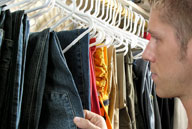Back to School Shopping For Smart Spenders
 As we look forward to cooling temperatures, heating costs will rise. And with today’s rising energy and food costs, back to school shopping lists – which can call for anything from unleaded pencils to laptop computers – can look costly.
As we look forward to cooling temperatures, heating costs will rise. And with today’s rising energy and food costs, back to school shopping lists – which can call for anything from unleaded pencils to laptop computers – can look costly.
But no one has to mortgage their home to buy new backpacks or sneakers – there are smart ways to manage back to school spending. Discover Card offers these five tips for parents looking to shop savvy this fall:
1. Decide What Your Kids Need.
Many schools send letters listing the supplies students need at the beginning of the year. Use your child’s school supply list to determine what new items are absolute necessities.
Start looking for deals on the must-haves as early as possible. When shopping, stick to your list. Impulse buying and adding on “extras” are the quickest ways to negate any savings you find.
2. Take an Inventory. Using your list of necessities, take an inventory of what your family already owns. Last year’s lunchbox or fall coat, unless broken or outgrown, will still work. You may have extra notebooks, pens or pencils that your child can use.
3. Create a Budget. A budget keeps parents on track and teaches kids wise spending. Explain the budget to your child and encourage them to help you stick to it. As an incentive, offer them a reward, like allowing them to purchase a treat with the extra money saved. Even better, put the extra money into a savings account.
4. Shop on Tax-Free Days. Fourteen states and the District of Columbia offer tax holidays for back-to-school shopping. Shoppers pay no sales tax on items such as books, clothes, electronics and school supplies. Check your state’s official Web site to see if and when your state offers tax-free days.
5. Search Multiple Stores and Don’t Forget the Web. Compare stores by searching weekly circulars. If you don’t want to run from store to store to track down bargains, see if your favorite retailer matches competitors’ prices.
Search for discounts on the Web. Many stores offer online-only specials and free shipping. Some online shopping portals, like ShopDiscover.com, offer 5 percent or more cashback bonus on online purchases made through their site at top department stores, clothing and sports-equipment retailers.
To find out more about how Discover Card helps its cardmembers make their money go further, visit www.discover.com/backtoschool.






